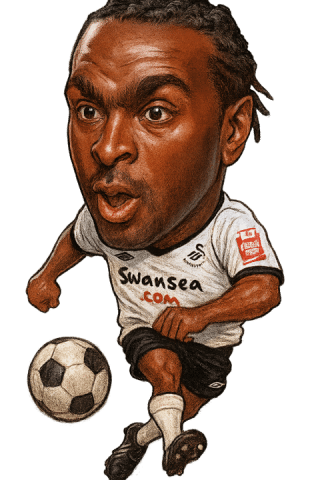There are strikers who score goals, and then there are strikers who leave a mark. Jason Scotland did both. In just two seasons at Swansea City, he became a cult hero, powerful, clinical, and utterly relentless. His goals weren’t just numbers, they were moments. Moments that lifted the Liberty, turned games, and helped shape a promotion-winning side that played with swagger and belief.
This edition of Wore Both Colours turns the spotlight on one of Swansea’s finest forwards who also wore the blue of Ipswich Town. While his time at Portman Road didn’t reach the same heights, Scotland’s presence was felt. He brought experience, grit, and a striker’s instinct to a side searching for identity. And in doing so, he carved out a quieter but still respected chapter in Suffolk.
From Trinidad to the terraces of South Wales and East Anglia, Jason Scotland’s journey is one of goals, graft, and a grin that never faded. This is the story of a man who wore both colours and made them matter.
🌴 The Early Years
Jason Kelvin Scotland was born on 18 February 1979 in Morvant, a suburb of Port of Spain, Trinidad and Tobago. Raised in a football-loving culture, Scotland’s early years were shaped by the rhythms of Caribbean life and the competitive spirit of Trinidadian football. He attended Malick Senior Comprehensive School, a known breeding ground for local talent, and quickly stood out for his strength, finishing, and natural instinct in front of goal.
His first taste of senior football came with San Juan Jabloteh, where he scored nine goals in nine league games. That form earned him a move to Defence Force, one of Trinidad’s most respected clubs, where he continued his rise with an astonishing 30 goals in 31 appearances. These numbers weren’t just impressive, they were impossible to ignore.
Scotland’s performances at home caught the eye of scouts abroad. In 2003, he was invited for a trial with Dundee United in Scotland. Alongside fellow Trinidadian Devon Mitchell, he impressed the coaching staff and secured a move to the Scottish Premier League. It was the beginning of a journey that would take him from the Caribbean heat to the cold terraces of Tannadice, and eventually to the Liberty Stadium and Portman Road.
🟠 Dundee United and St Johnstone
Jason Scotland arrived at Dundee United in 2003 after impressing during a trial alongside fellow Trinidadian Devon Mitchell. The move was a significant step up, taking him from the Caribbean leagues to the Scottish Premier League. He made his debut in August 2003 and quickly became a fan favourite at Tannadice for his strength, hold-up play, and eye for goal. Over two seasons, he made 71 appearances and scored 13 goals, often used as an impact player rather than a regular starter.
Despite his popularity, Scotland’s time at Dundee United ended in frustration. A work permit issue in 2005 meant he was unable to renew his contract, forcing him to drop into the Scottish First Division with St Johnstone. It proved to be a blessing in disguise. At McDiarmid Park, he rediscovered his scoring touch, netting 33 goals in 66 appearances across two seasons. His performances were electric, powerful finishes, clever movement, and a growing confidence that made him one of the most feared strikers outside the top flight.
It was at St Johnstone that Jason Scotland truly found his rhythm in British football. It was there that Swansea City came calling.
🦢 Swansea City
Jason Scotland signed for Swansea City in May 2007, joining from St Johnstone on a free transfer. It was a move that would define his career. Under Roberto Martínez, Scotland flourished in a side built on possession, movement, and attacking intent. He wasn’t just a striker. He was the focal point of a team on the rise.
In his first season, Scotland scored 29 goals in all competitions, including 24 in League One, as Swansea stormed to the title. He was named in the PFA Team of the Year and won the club’s Player of the Year award. His goals came in all shapes. Poacher’s finishes, powerful drives, and cool penalties. But it was his presence that mattered most. He held up play, bullied defenders, and gave Swansea a cutting edge they hadn’t had in years.
The following season in the Championship, Scotland proved he could do it at a higher level. He netted 21 goals, including crucial strikes against Derby, Watford, and Burnley. His partnership with the likes of Nathan Dyer and Jordi Gómez gave Swansea a fluid, dangerous attack. Fans loved him not just for the goals, but for the grin, the graft, and the sense that he was one of them.
By the summer of 2009, Scotland had scored 45 goals in 90 league appearances for the Swans. He was adored at the Liberty, and his departure to Wigan Athletic felt like the end of an era. But his legacy was secure. Jason Scotland wasn’t just a striker. He was a symbol of Swansea’s ambition.
🔵 Wigan Athletic
In July 2009, Jason Scotland joined Wigan Athletic for a reported fee of £2 million, reuniting with Roberto Martínez in the Premier League. It was a bold step, a chance to test himself at the highest level. Swansea fans wished him well, knowing he had earned the move. But the Premier League is unforgiving, and Scotland’s time at Wigan never matched the heights of his Swansea days.
Used mostly as a squad player, Scotland struggled to find rhythm and consistency. He made 32 appearances in all competitions but scored just once, a League Cup goal against Blackpool. The pace of the Premier League, the tactical demands, and limited minutes made it hard for him to settle. Martínez remained supportive, but the goals didn’t come.
Still, Scotland’s professionalism never wavered. He worked hard, kept his head down, and remained a respected figure in the dressing room. By the summer of 2010, it was clear he needed a fresh start. Ipswich Town came calling, and with them, a chance to play regular football again.
🔷 Ipswich Town
Jason Scotland signed for Ipswich Town in August 2010, joining Roy Keane’s squad in the Championship. It was a move that gave him what Wigan couldn’t: regular football and a chance to lead the line. At Portman Road, Scotland found a new rhythm. He wasn’t the explosive scorer of his Swansea days, but he was still sharp, still clever, and still capable of turning a game.
In his first season, he scored 10 league goals, including a brace against Doncaster and a winner against Sheffield United. He played with intelligence, linking play and mentoring younger forwards. His role shifted from talisman to elder statesman, but the respect remained. Fans appreciated his work rate, his professionalism, and the flashes of quality that reminded them of his pedigree.
Scotland stayed with Ipswich for two and a half seasons, making over 80 appearances and scoring 18 goals. He wasn’t a headline act, but he was a steady presence in a team that often lacked consistency. When he left in 2013, he did so with quiet dignity, having given Ipswich his best in a different phase of his career.
🌍 Life After Ipswich
After leaving Ipswich Town in 2013, Jason Scotland signed for Barnsley, adding one final Championship chapter to his career. He scored on his debut and gave the Tykes a short burst of experience and firepower. But by early 2014, his time in the English leagues was winding down. Scotland returned to his roots, signing for Hamilton Academical in the Scottish Premiership.
At Hamilton, he played with pride and purpose. He helped the club secure promotion and stayed on for another season, mentoring younger players and contributing on and off the pitch. In 2015, he joined Stenhousemuir in Scottish League One, where he made 15 league appearances and scored 5 goals. It was a short but respected stint, and it marked the final chapter of his playing career.
Jason Scotland finished his time in British football the way he had lived it. Quietly effective, grounded, and always giving his best.
🧠 After Football
Jason Scotland didn’t drift away from football when he retired. He leaned in. Determined to give back to the game that shaped him, he earned his UEFA B and A coaching licences, building the foundation for a second career on the touchline. His approach was methodical, ambitious, and grounded in the same work ethic that defined his playing days.
He began coaching at Hamilton Academical, working with youth teams and serving as a forward coach. His ability to mentor young strikers, share lived experience, and communicate with clarity made him a natural fit. In 2021, Scotland took another step forward, joining Glasgow Rangers as an academy coach. It was a proud moment for a player who had climbed every rung of the British football ladder.
Today, Scotland continues his coaching journey with Larkhall Thistle, a club rooted in community and development. His presence there isn’t about prestige. It’s about purpose. He’s helping shape the next generation, bringing Caribbean grit and British experience to the grassroots.
Jason Scotland’s after-football life is exactly what you’d expect from him. Grounded, generous, and still in love with the game.
🏁 Closing Salvo
Jason Scotland’s journey wasn’t built on headlines. It was built on moments. A goal at the Liberty that lifted the roof. A shift in tempo at Portman Road. A quiet word with a young striker at Hamilton. He played with power, with pride, and with a grin that told you he loved every minute.
He wore the white of Swansea and the blue of Ipswich. He scored, he grafted, and he gave fans something to believe in. And when the boots came off, he kept giving. Coaching, mentoring, building the game from the ground up.
This wasn’t just a career. It was a contribution. Jason Scotland wore both colours. And he made them matter.

This article first appeared on JACKARMY.net.

